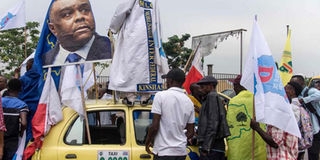World must stand up for free elections in DRC

Opposition supporters stand on a car next to a placard with the picture of President Joseph Kabila during a demonstration against the electoral process scheduled for the December elections on October 26, 2018. PHOTO | JUNIOR D. KANNAH | AFP
What you need to know:
- Because of Congo’s wealth, the Belgians brutally fought attempts to end colonial rule.
- Western mining interests, for example, supported Katanga Province to rebel against Prime Minister Patrice Lumumba.
- Africa must now engage meaningfully and practically or forever stop mourning the betrayal of its most endowed member.
As pioneer African leaders embarked on the final push for the total liberation of the continent from colonial rule, they had some broad consensus that Congo — later Zaire and now Democratic Republic of Congo (DRC) — was destined to be an economic base and power to sustain the continent in a fiercely competitive global environment.
Kwame Nkrumah spoke about it at the launch of the Organisation of African Unity (OAU) in 1963, mentioning Congo twice in promising proclamations.
Emperor Haile Selassie of Ethiopia also referred to Congo in similar terms at the event.
More than three decades earlier, at the League of Nations conference in Geneva, Haile Selassie had spoken about Congo’s potential for Africa and how its failure would destabilise the continent and put world powers at logger heads.
EXPORTED COPPER
In Addis in 1963, Nkrumah spoke of how Western firms exported copper, rubber, cotton, and other goods to the value of $2,773 billion between 1945 and 1955.
He also noted that experts had estimated the Congo basin alone could produce enough food crops to feed nearly half the world population.
The years between 1945 and 1955 were a nightmare globally after the Second World War.
According to Nkrumah, this is the period Congo supplied the Western world with resources – but the country was betrayed and put into a path of instability it has never recovered from.
For this betrayal and its consequences, Africa and the world – particularly the US, the United Nations and Belgium – owe Congo a debt they must settle this year. There may never be another chance.
COLONIAL RULE
Because of Congo’s wealth, the Belgians brutally fought attempts to end colonial rule. And when Belgium could no longer stop the independence that finally came in June 1960, it conspired with other Western powers to tear the country apart while continuing to exploit it.
Western mining interests, for example, supported Katanga Province to rebel against Prime Minister Patrice Lumumba. This was followed by the secession of South Kasai, the second richest region.
Patrice Lumumba was then ousted and later executed by Belgian troops and replaced with the US-backed president, Joseph Kasavubu, and his military commander Joseph Mobutu who would later become President. Congo’s free fall had begun. The tearing up of the country in many ways broke Africa’s heart.
In June this year, Belgian authorities honoured Lumumba by naming a square in Brussels after him, 58 years after Congo’s independence.
TOKENISM
Belgium and the rest of the world can, and must do more than such acts of tokenism. The upcoming elections provide an avenue to pay historical debts by standing up for free, fair and credible elections scheduled for December 23 in the country that changed its name to DRC in 1997. The former colonial power must also come clean on accusations that it is trying to install a puppet regime while intimidating and arm-twisting opposition parties not allied to Brussels.
It is worrying that the UN, another body with as much baggage as Belgium, is being accused of manipulating data ahead of elections to give an overly positive impression of the situation. That is how it begins: accusations followed by denial then more manipulation and later chaos.
The US has so far done well, particularly in pressuring President Joseph Kabila to hold elections and stay out of the race. It must do more to ensure those elections are seen as credible.
FIGHTING
And Africa must now engage meaningfully and practically or forever stop mourning the betrayal of its most endowed member. At the beginning of this century, Congo got really messy.
Many armies, including Rwanda, Uganda, Angola, Zimbabwe and Namibia and thousands of Hutu militiamen responsible for the Rwandan genocide, as well as local militia were fighting inside the country, for various reasons. Some armies were allied with rebel groups to oust then President Laurent Kabila. Should next week’s elections go bad, DRC’s problematic past may recur – and the consequences could be grimmer.
Mr Onyango is the spokesman for former Prime Minister Raila Odinga




